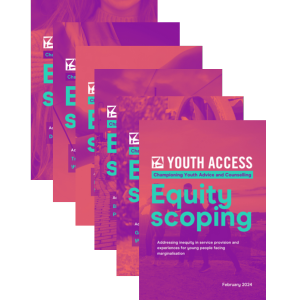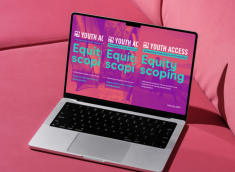All young people deserve access to support that respects their rights and meets their needs. Yet too often, the very systems created to support young people perpetuate inequality and reproduce systems of oppression. Put simply, many young people remain under-heard and under-served, facing barriers to services often not designed for, or reflective of them. We’re striving to change this.
We know that community-based, early support services like our members have a better reach to young people from some of the worst served groups than statutory services. But much more needs to be done to dismantle institutional systemic barriers and discrimination, improve understanding and provision across our network, and spread good practice.
This is a process, and we know that we have a long way to go. Dismantling engrained systems of inequality and oppression won’t happen overnight. We will continue to learn and challenge ourselves along the way, guided by the voices of young people and their lived experiences, experts and services working with these young people.
We accept that we might not always get it right, but we won’t let this stop us from trying. Our programme of equity work will be developed and delivered over the coming years. To help guide our ongoing operational and project decisions, we’ve put together a set of principles to help us stay accountable.
Guiding principles
Bold
- We are focused on bringing about meaningful change and know that this takes time, effort and investment; we do not just go for the quick and easy wins.
- We acknowledge and focus on the structural factors affecting young people’s experiences.
- We are hopeful and aspire for big outcomes, as well as being realistic about what we can achieve within our capacity.
- We are transparent about our priorities, decision-making and rationale.
Collaborative
- We know that we alone do not hold the knowledge and experience necessary to deliver the outcomes we want to achieve.
- We acknowledge the central importance of lived experience and ensure that engagement with young people is a safe and positive experience.
- We share power and resources with organisations that we partner with and set clear terms and expectations about roles and responsibilities.
Responsive
- We are honest about what we don’t know. We accept that we may make mistakes and to learn from them.
- We are open to being challenged on our assumptions, decisions and direction.
- We recognise that this work involves emotional labour for staff who have lived experience of oppression and provide appropriate support.
Our work
Driving equity is one of our three strategic goals for 2022-27. This year, we have commissioned an independent mapping and scoping review to inform our strategy implementation.
The scoping review aimed to identify and assess the structural and systemic barriers that may be preventing marginalised groups from accessing resources, opportunities and outcomes on an equal basis with other groups. It was designed to gain a better understanding of which groups of young people remain under-served by Youth Information, Advice and Counselling Services (YIACS) and other services, the barriers these young people face in accessing support, and how YIACS and other services can best meet their needs.
The in-depth exploration of the service needs, barriers, and experiences of 5 communities of young people found that experiences were complex and in need of tailored approaches. Some of the criteria we used to make decisions about which groups we should focus on included:
- Whether or not being part of the group might form part of a young person’s identity.
- Whether or not the group could be identified by services as a client group, as opposed to a service need or a condition.
- The group’s fit with the nine protected characteristics of the Equality Act 2010 (age; disability; gender reassignment; marriage and civil partnership; pregnancy and maternity; race; religion or belief; sex; sexual orientation).
The size of the group and the perceived extent of its unmet needs and marginalisation from access to services.
With this in mind, the review provides an in-depth exploration of the service needs, barriers and experiences of:
- Black young people and young people from racialised communities
- Gypsy, Roma and Traveller young people
- Refugee and asylum seeking young people
- Trans and gender diverse young people
- Deaf young people
It is acknowledged that some of the criteria used to determine which groups to focus on are subject to subjectivity or bias, and that applying them required an element of arbitrary decision-making rather than an entirely scientific process.
Furthermore, addressing entrenched inequalities in service access and experience is complex, requiring a sophisticated understanding of the needs, cultures, and help-seeking behaviours within each specific group, as well as the reasons for the shortcomings within services. It should also be noted that young people within groups are not heterogeneous; there are a range of different experiences as well as intersections with other protected characteristics.

We are using the findings to guide our equity implementation plan and today publish 5 reports focusing on the experiences of each aforementioned group alongside a summary report.
Whether driving equity through research, campaigning or training, we will be bold, collaborative and responsive in our approach. Without equity, we can’t achieve our organisational vision. That is why we will maintain a dedicated focus on making service provision more equitable. Adopting a lens of social justice so that no young person is left behind, but is lifted and supported on their journey into adulthood, by community-based advice and counselling services that respect their rights and meet their individual needs.
